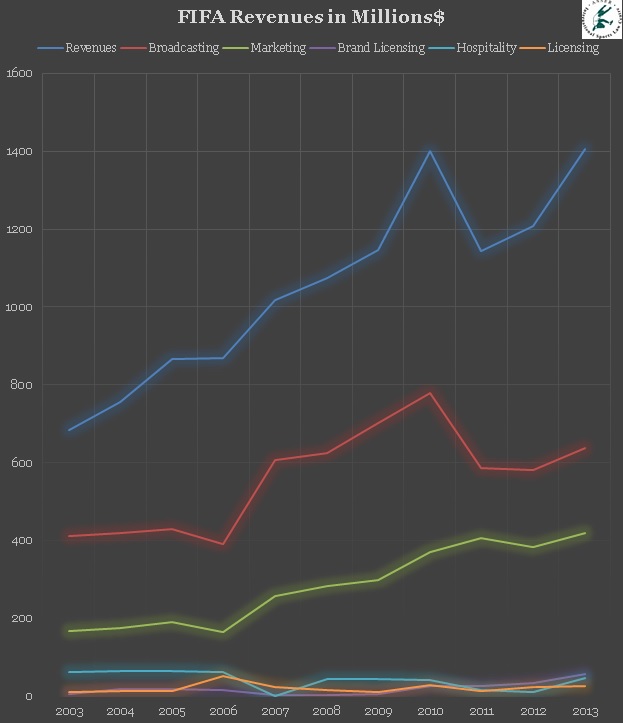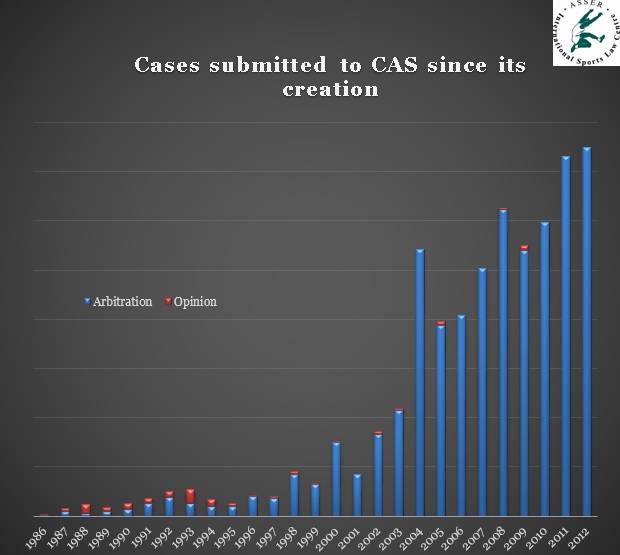On next Thursday the 2014 World
Cup will kick off in Sao Paulo. But next week will also see the FIFA members meeting on Tuesday and Wednesday at a
much awaited FIFA congress. For this special occasion we decided to review
FIFA’s financial
reports over the
last ten years. This post is the first of two, analysing the reports and
highlighting the main economic trends at play at FIFA. First, we will study the
revenue streams and their evolution along the 2003-2013 time span. In order to ensure
an accurate comparison, we have adjusted the revenues to inflation, in order to
provide a level playing field easing the comparative analysis over the years
and types of revenues. Our first two graphs gather the main revenue streams
into two comparative overviews. Graph 1 brings together the different types of
revenues in absolute numbers, while Graph 2 lays down the share of each type of
revenues for any given year (the others category covers a bundle of minor
revenue streams not directly relevant to our analysis).

Graph 1: FIFA revenues
in Millions of Dollars, 2003-2013 (adjusted for inflation). More...
This year the race for UEFA Europa League places in Serie A was
thrilling. In the final minutes of the last game of the season, Alessio Cerci,
Torino FC striker, had the opportunity to score a penalty that would have
qualified his team to the 2014-2015 edition of the UEFA Europa League. However,
he missed and Parma FC qualified instead. More...
Shortly after his election as IOC President, Thomas Bach announced his intention to initiate an introspective reflection and reform cycle dubbed (probably a reference to former German Chancellor Gerhard Schröder’s publicly praised Agenda 2010) the Olympic Agenda 2020. The showdown of a year of intense brainstorming is to take place in the beginning of December 2014 during an IOC extraordinary session, in which fundamental reforms are expected. More...
Pursuant to Kelsen’s famous pyramid, the authority of norms may be
ranked according to their sources: Constitution is above the Law, which is in
turn superior to the Regulations, which themselves stand higher to the
Collective Agreement etc…Under French labour law, this ranking can however be
challenged by a “principle of favourable treatment” which allows a norm from a
lower rank to validly derogate from a superior norm, if (and only if) this
derogation benefits to the workers.
On 2
April 2014, the Cour de Cassation (the French Highest Civil Court) considered that
these principles apply in all fields of labour law, regardless of the
specificity of sport[1]. In this case, Mr. Orene Ai’i, a professional
rugby player, had signed on 13 July 2007
an employment contract with the Rugby Club Toulonnais (RCT) for two sport
seasons with effect on 1 July 2007. More...

Graph 1: Number of Cases submitted to CAS (CAS Satistics)
More...
Dahmane v KRC
GENK
Court of Labour
of Antwerp (Hasselt district) 6 May 2014
Chamber 2
Algemeen rolnummer 2009/AH/199
The Facts More...
Yesterday, the press revealed
that the European Commission decided to reject the complaint filed by
Jean-Louis Dupont, the former lawyer of Bosman, on behalf of a player agent
Striani, against the UEFA Financial Fair Play (FFP) Regulations. The rejection
as such is not a surprise. The Commission had repeatedly expressed support of
the principles underlying the UEFA FFP. While these statements
were drafted vaguely and with enough heavy caveats to protect the Commission
from prejudicing a proper legal assessment, the withdrawal of its support would
have been politically embarrassing.
Contrary to what is now widely assumed, this decision
does not entail that UEFA FFP regulations are compatible with EU Competition
Law. UEFA is clearly the big victor, but the legal reality is more complicated
as it looks. More...
The UEFA Club Licensing and Financial Fair Play
Regulations have been implemented by UEFA since the season 2011/12 with the aim
of encouraging responsible spending by clubs for the long-term benefit of
football. However, the enforcement of the break-even requirement as defined in
Articles 62 and 63 of the Regulations (arguably the most important rules of
FFP) has only started this year. Furthermore, UEFA introduced recently
amendments to the Procedural rules governing the Club Financial Control Body
(CFCB) allowing settlement agreements to be made between the clubs and the
CFCB.
On Friday 16 May, UEFA finally published the nine
separate settlement agreements between the respective clubs and the CFCB regarding
the non-compliance with the Financial Fair Play (FFP) break-even requirements. More...
Yesterday, UEFA published the very
much-expected settlements implementing its Financial Fair Play (FFP)
regulations. Today, we address tomorrow’s challenges for FFP, we offer five,
more or less realistic, scenarios sketching the (legal) future of the FFP
regulations. More...
Mohamed Dahmane is a professional football player of
French-Algerian origin, who has played for a variety of European clubs,
including French club US Mauberge, Belgian club RAEC Mons and Turkish club Bucaspor.
However, he will mostly be remembered as the player whose legal dispute with his former club (Belgian
club KRC Genk) revived the debate on football players’ labour rights. More...